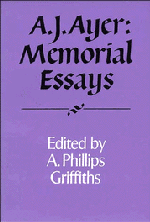Book contents
- Frontmatter
- Contents
- Preface
- A Defence of Empiricism
- Ayer: the Man, the Philosopher, the Teacher
- Ayer's Place in the History of Philosophy
- AYER'S ATTACK ON METAPHYSICS
- Ayer and World Views
- Language, Newspeak and Logic
- On the relation between Common Sense, Science and Metaphysics
- Logical Positivism and Intentionality
- Probability and the Evidence of our Senses
- Seeing Qualia and Positing the World
- Three Varieties of Knowledge
- The Importance of ‘If’
- Ayer's Ethical Theory: Emotivism or Subjectivism?
- Subjectivism and Toleration
- An Interview with A. J. Ayer
- Notes on Contributors
- References
- Index
Ayer's Place in the History of Philosophy
Published online by Cambridge University Press: 01 July 2010
- Frontmatter
- Contents
- Preface
- A Defence of Empiricism
- Ayer: the Man, the Philosopher, the Teacher
- Ayer's Place in the History of Philosophy
- AYER'S ATTACK ON METAPHYSICS
- Ayer and World Views
- Language, Newspeak and Logic
- On the relation between Common Sense, Science and Metaphysics
- Logical Positivism and Intentionality
- Probability and the Evidence of our Senses
- Seeing Qualia and Positing the World
- Three Varieties of Knowledge
- The Importance of ‘If’
- Ayer's Ethical Theory: Emotivism or Subjectivism?
- Subjectivism and Toleration
- An Interview with A. J. Ayer
- Notes on Contributors
- References
- Index
Summary
When A. J. Ayer arrived in Oxford in the autumn of 1929 he had no thought of becoming a professional philosopher. He intended to go to the Bar, but, in the manner of an Etonian, by way of Literae Humaniores rather than the study of law. He had read a couple of philosophical books. The first of them was Russell's Sceptical Essays (Russell, 1928), which he bought on its first appearance in 1928. The other was Principia Ethica (Moore, 1903), to which he had been led by a reverent aside in Clive Bell's Art (1914). These choices were significant. Ayer always thought of himself as Russell's successor. He modelled his thought on that of Russell, both in its content and in its unguarded expression and also, to some extent, his manner of life, both political and amorous. What he got from Moore is less obvious, although his respect for Moore is evident, as is shown by the preface to Language, Truth and Logic and by his devoting a book to a close examination of his ideas, along with those of Russell. An important likeness is that both Moore and Ayer were provoked to philosophize by the assertions of other philosophers, not by problems arising outside philosophy in mathematics or the sciences, in history or everyday life.
Ayer avoided the full rigour of an Oxford training in the classics, devoting one term only to the acquisition of a minimal requirement in them. So, at the beginning of 1930, he started on the formal study of philosophy.
- Type
- Chapter
- Information
- A. J. Ayer: Memorial Essays , pp. 31 - 48Publisher: Cambridge University PressPrint publication year: 1992
- 1
- Cited by



